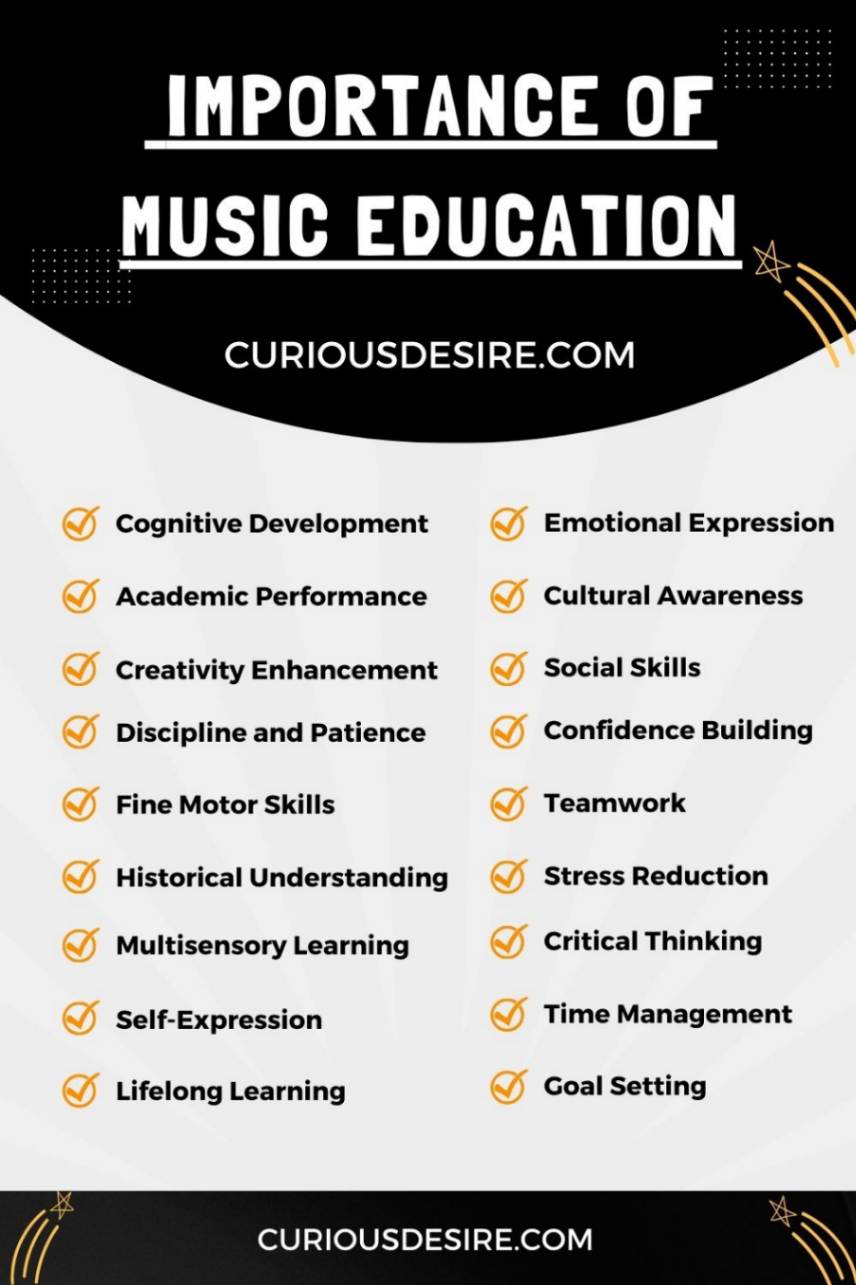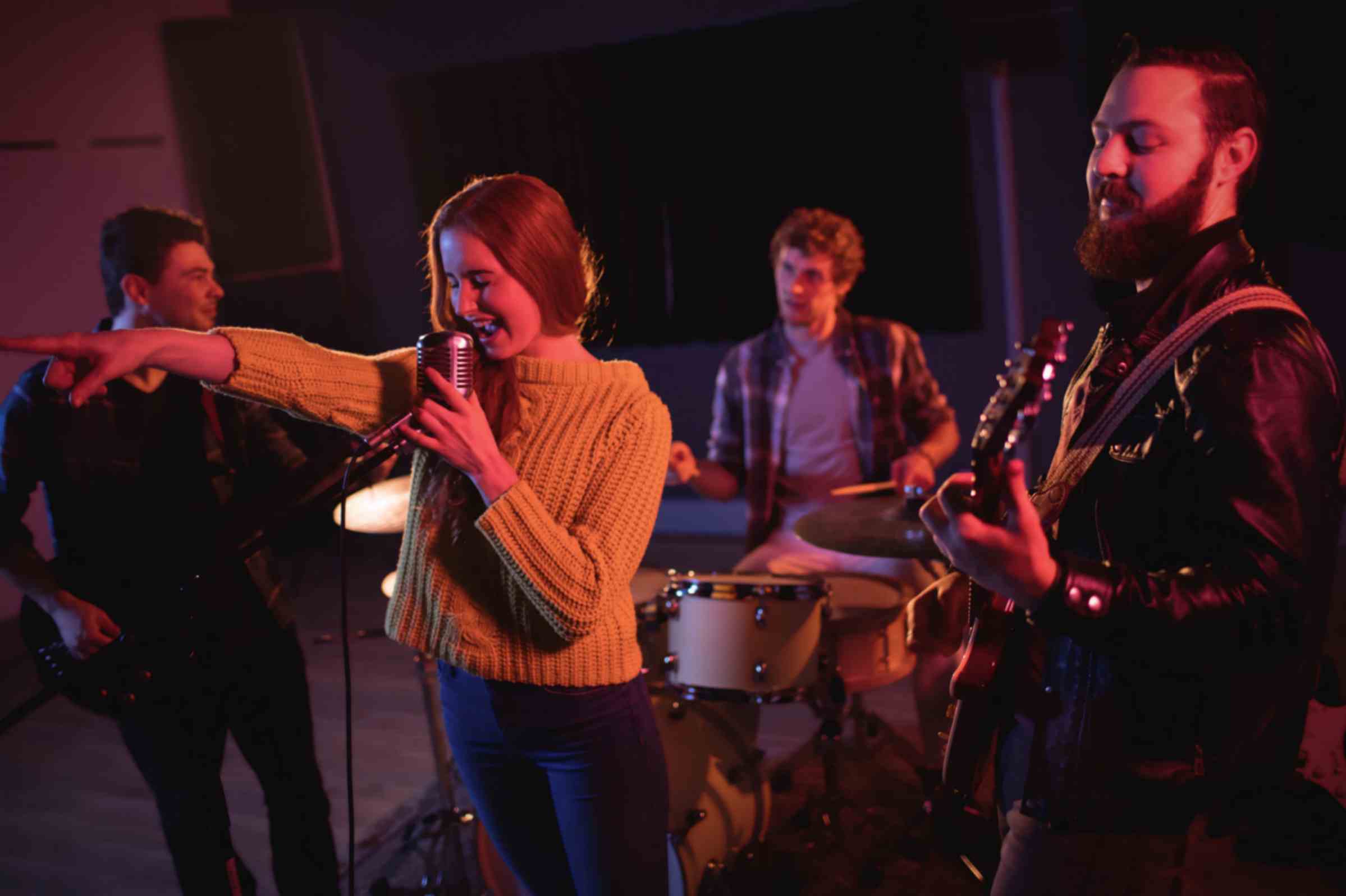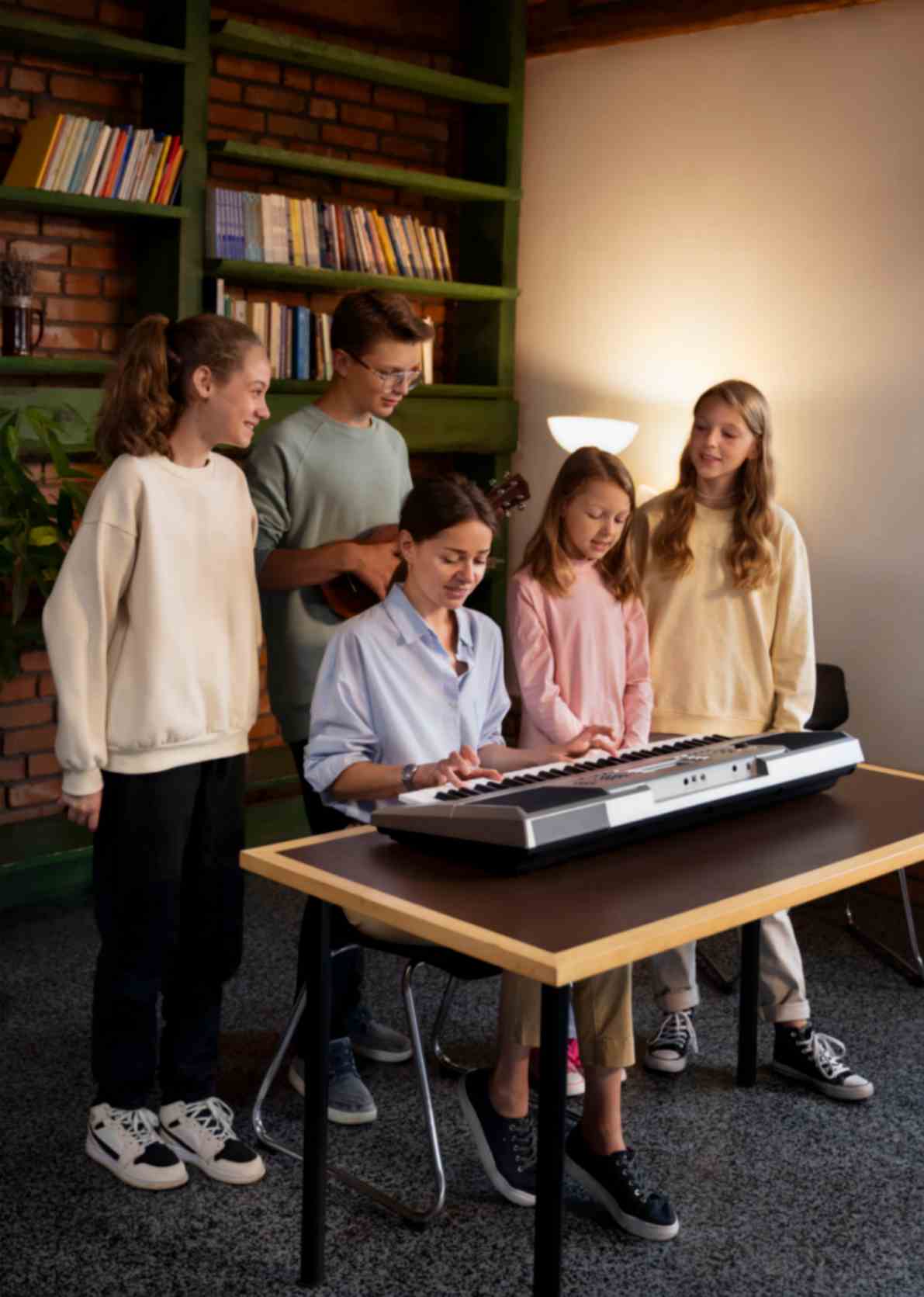Music education matters because it has a big impact on how we grow and learn. When we learn about music, we’re not just learning how to play instruments or sing songs.
We’re also learning important skills that help us in many parts of our lives. It helps us think better, feel better, and understand the world around us differently. Plus, it’s a lot of fun!
So, music education isn’t just about music – it’s about helping us become better, happier people. In a world full of different sounds and melodies, learning about music opens a door to a lifelong journey of discovery and growth.
It’s like having a special key that unlocks not just the world of music, but also a world of creativity, teamwork, and endless possibilities.
Here are the 5 most common reasons for the importance of music education:
- Cognitive Development
- Emotional Expression
- Improved Academic Performance
- Cultural Awareness
- Social Skills
1. Cognitive Development
Music positively influences cognitive development by engaging different brain areas and promoting essential cognitive skills.
For example, a pianist reading sheet music, translating the notes into finger movements, and maintaining the rhythm enhances both short-term and long-term memory.
Additionally, the sustained attention required for rhythmic precision during musical activities stimulates executive functions like working memory and attention control.
This sustained focus not only enhances the ability to multitask within the musical context but also contributes to improved cognitive abilities in other aspects of life.
2. Emotional Expression
Music is a powerful medium for emotional expression, allowing individuals to convey and explore a wide range of feelings.
When we listen to music, whether it’s a soulful ballad or an energetic anthem, it resonates with our emotions and provides an outlet for expression.
For instance, playing a melancholic melody on a piano or singing along to an uplifting song can help us articulate and process complex emotions, offering a therapeutic means of connecting with our innermost feelings.
The ability of music to capture and communicate emotions enhances our emotional intelligence, promoting a deeper understanding of ourselves and others.
3. Improved Academic Performance
Engaging with music has been linked to improved academic performance, as it contributes to cognitive development and enhances various intellectual skills.
When individuals actively participate in musical activities, such as learning to play an instrument, they stimulate different areas of the brain responsible for memory, attention, and problem-solving.
Research suggests that students involved in music programs often perform well in subjects like mathematics and language arts, showcasing the positive impact of musical engagement on overall academic achievement.
Additionally, the discipline and dedication required to learn and practice music can develop valuable study habits and perseverance, further supporting academic success.
4. Cultural Awareness
Music serves as a powerful tool for promoting cultural awareness by providing a sonic gateway to diverse traditions and expressions from around the world.
Different musical genres carry the unique stories, histories, and identities of various cultures.
For example, exploring the intricacies of Flamenco music introduces us to the rich cultural tapestry of Spain, while immersing us in the rhythms of traditional African drumming and offers a glimpse into the vibrant heritage of African communities.
Music becomes a universal language that transcends borders, connecting people through shared melodies and narratives.
5. Social Skills
Music plays an important role in the development of social skills by promoting collaboration, communication, and teamwork.
Whether participating in a band, choir, or other musical ensemble, individuals learn to work together towards a common goal – creating harmonious music.
Collaborative musical activities require effective communication, active listening, and mutual understanding among group members.
For instance, playing in a band demands coordination to maintain rhythm and harmony, while singing in a choir necessitates blending voices effortlessly.
These shared musical experiences promote a sense of unity, teach the importance of teamwork, and contribute to the development of strong interpersonal skills.
6. Discipline and Patience
Engaging with music develops discipline and patience as individuals handle the process of learning and mastering an instrument or musical skill. It requires consistent practice, attention to detail, and perseverance over time.
For instance, diligently practicing scales on a guitar or perfecting a drumming technique demands a disciplined approach.
This dedication not only refines musical abilities but also cultivates a broader sense of discipline that extends into other aspects of life.
Learning to play an instrument teaches individuals the value of consistent effort and the rewards that come with patient, focused practice.
7. Confidence Building
Music serves as a powerful catalyst for building confidence by providing individuals with a platform to express themselves creatively.
Whether through singing, playing an instrument, or composing, the act of creating music boosts self-esteem.
For example, a shy individual may discover newfound confidence when performing on stage, realizing their ability to connect with an audience.
The process of overcoming challenges, mastering musical techniques, and receiving positive feedback contributes to a sense of accomplishment, nurturing confidence that extends beyond the realm of music into various life situations.
8. Creativity Enhancement
Music enhances creativity by encouraging individuals to explore, experiment, and express themselves in unique ways.
Whether composing original pieces, improvising on an instrument, or experimenting with different musical styles, the creative aspects of music open up a world of possibilities.
For instance, a musician composing a new song faces limitless creative choices in terms of melody, harmony, and rhythm. Engaging in such creative pursuits not only refines musical skills but also stimulates imaginative thinking and problem-solving.
9. Teamwork
Playing music with others is like being on a team. Whether you’re in a band, singing in a choir, or just jamming with friends, everyone has a role to play. It’s not just about your skills; it’s about how well you work together.
Like in a sports team, each member contributes something important. When everyone plays their part, the music sounds great.
For instance, imagine being in a band where the drummer keeps the beat, the guitarist adds melody, and the singer brings the lyrics to life. When everyone collaborates smoothly, the result is a fantastic song.
Learning to work together in music teaches us how to cooperate and be good team players, skills that are helpful in many areas of life.
10. Stress Reduction
Listening to music can help calm us down and make us feel better. Have you ever noticed that when you’re feeling stressed or anxious, putting on your favorite song can make things seem a bit easier?
It’s like magic for our mood! The sound of music can trigger our brain to release chemicals that make us feel good and relaxed. Playing an instrument can have a similar effect.
The focus it requires helps take our minds off stress, creating a kind of musical therapy.
So, whether you’re playing a calming melody on the piano or just listening to a soothing tune, music has this special power to reduce stress and make us feel more at ease.
11. Fine Motor Skills
Learning to play a musical instrument is like a workout for your fingers. When you play the piano, guitar, or even the violin, you need to use your fingers in precise ways to create the right sounds.
It’s like teaching your hands to dance! This practice helps improve your fine motor skills – the small movements of your fingers and hands.
For example, pressing the keys on a piano or plucking the strings of a guitar requires careful coordination and control.
Developing these fine motor skills through music not only makes you a better musician but also enhances your ability to do other activities that involve precise hand movements, like writing or typing.
12. Historical Understanding
Music is like a time machine that can take you back to different eras. Each style of music is connected to a particular time in history, reflecting the culture and events of that period.
For instance, listening to jazz can transport you to the Roaring Twenties, while classical music might make you feel like you’re in a grand palace from centuries ago.
Exploring the history of different musical genres helps us understand the society, values, and emotions of people in the past.
It’s like opening a musical history book that allows us to experience the sounds and rhythms of bygone times, creating a unique connection between the past and the present.
13. Multisensory Learning
Making music is a multisensory experience that involves more than just hearing. When you play an instrument, you use your eyes to read sheet music, your ears to listen to the sounds you’re creating, and your hands and fingers to produce the music.
For example, a drummer not only listens to the beat but also feels the vibrations through the drumsticks and sees the rhythm patterns on the sheet music.
Engaging multiple senses in music enhances the learning experience, making it more enjoyable and effective.
This multisensory approach not only deepens our connection to the music but also improves our overall ability to absorb and retain information in other areas of learning.
14. Critical Thinking
Playing and understanding music involves more than just following notes; it requires critical thinking.
When you encounter a new piece of music, you need to analyze it, break it down, and make decisions on how to interpret and express it. It’s like solving a musical puzzle.
For instance, a pianist might think about the emotions conveyed in a piece and decide on the appropriate tempo and dynamics.
Engaging in musical analysis encourages critical thinking skills, helping individuals to evaluate, interpret, and make informed decisions, which are valuable skills applicable in various aspects of life beyond the realm of music.
15. Time Management
Whether you’re practicing the guitar or rehearsing with a band, you need to allocate time effectively. It’s like balancing different tasks on a musical schedule.
For example, setting aside dedicated practice sessions ensures gradual improvement, and organizing group rehearsals demands coordinating everyone’s schedules.
Through musical journeys, individuals develop the ability to manage their time efficiently, prioritizing practice, rehearsals, and other commitments.
These time management skills cultivated through music extend into academic, professional, and personal domains, contributing to a well-organized and balanced life.
16. Goal Setting
Music provides a natural framework for goal setting. Learning to play an instrument involves setting small, achievable goals to master specific techniques or pieces of music.
These musical milestones serve as stepping stones towards larger objectives. For example, a violinist might set a goal to play a challenging piece after mastering the fundamental techniques.
This process of setting, pursuing, and achieving musical goals develops a sense of accomplishment and motivation.
Transferring these goal-setting skills from music to other areas of life, individuals can apply the same structured approach to academic achievements, career aspirations, and personal development, promoting a proactive and goal-oriented mindset.
17. Self-Expression
Music is a powerful medium for self-expression, allowing individuals to communicate their emotions, thoughts, and experiences without words. When you play an instrument or sing, you’re expressing yourself through the music you create.
It’s like telling a story with sound. For example, composing a piece of music can be a deeply personal way to convey your feelings or share your unique perspective with the world.
Engaging in musical self-expression promotes creativity, authenticity, and a sense of identity, empowering individuals to communicate and connect with others in a profoundly personal way.
18. Appreciation for Diversity
Music is a diverse and rich tapestry that reflects the multitude of cultures, traditions, and perspectives in the world. Exploring different genres of music exposes individuals to a variety of artistic expressions and cultural influences.
For instance, listening to reggae, flamenco, or hip-hop introduces unique rhythms, instruments, and storytelling styles associated with specific cultures.
This exposure promotes an appreciation for diversity, encouraging individuals to embrace the richness of global musical traditions.
Music becomes a bridge that connects people across cultural boundaries, promoting understanding, respect, and celebration of the diverse tapestry of human expression.
19. Enhanced Memory
Engaging with music has a positive impact on memory. When learning to play an instrument, individuals actively exercise their memory as they read and remember musical notes, patterns, and compositions.
It’s like training your brain to remember a special code for each note. Additionally, associating memories with specific pieces of music creates powerful connections.
For example, a song from your childhood might bring back vivid memories and emotions associated with that time. The act of recalling melodies, lyrics, and the emotional context of music strengthens both short-term and long-term memory.
This enhanced memory capacity not only benefits musical proficiency but also extends to other areas of life, aiding in academic and everyday memory tasks.
20. Lifelong Learning
Lifelong learning is the ongoing, voluntary, and self-motivated pursuit of knowledge and skills throughout one’s entire life.
In the context of music, it means that the process of learning and enjoying music doesn’t have an endpoint – it’s a journey that continues as long as an individual is willing to explore and grow.
Whether you’re picking up a new instrument, exploring a different genre, or refining your existing musical abilities, the idea is to embrace a mindset of continuous curiosity and discovery.
Lifelong learning in music is not confined to formal education; it involves informal exploration, experimentation, and a genuine passion for expanding one’s musical horizons.
This approach not only enriches personal enjoyment but also contributes to cognitive, emotional, and social well-being, showcasing that the joy of learning through music has no age limit.
Conclusion
Music education is not just a subject or a set of skills; it’s a powerful journey that shapes our minds, emotions, and interactions with the world.
By exploring the world of music, we not only acquire the ability to create beautiful melodies but also develop essential life skills – from critical thinking and teamwork to discipline and creativity.
Music education lays the foundation for a lifelong love of learning, offering a unique key to unlock the doors of personal growth and exploration.
As we embrace the joy and richness that music brings into our lives, we discover that its impact goes far beyond the notes on a page or the strumming of strings – it resonates within us, shaping us into more expressive, empathetic, and fulfilled individuals.
Importance of Music Education FAQs
1. Why is music education important?
Music education is important because it helps us think better, feel better, and learn important skills that make us better people. It’s like a fun way to grow and discover new things!
2. What skills does music education teach?
Music education teaches us skills like teamwork, discipline, and creativity. It’s not just about playing instruments – it’s about becoming a better and happier person.
3. How does music education help with emotions?
Music education helps us express and understand our feelings. Whether we’re happy or sad, playing or listening to music makes our emotions a bit easier to handle.
4. Can music education improve memory?
Yes, learning music can make our memory better. When we remember musical notes and songs, it’s like giving our brain a good workout, making it stronger.
5. Why is playing an instrument like being on a team?
Playing an instrument is like being on a team because everyone has a role, and we work together to create great music. It’s not just about individual skills; it’s about teamwork.
6. How does music education make learning more fun?
Music education makes learning more fun by adding a creative and enjoyable aspect. It’s like learning while having a good time, making it easier to remember and understand things.
7. Does music education help with stress?
Yes, music education can help with stress. Listening to music or playing an instrument is like a break for our minds, helping us feel more relaxed and happy.
8. Can music education be a lifelong journey?
Absolutely! Music education is not just for a short time; it’s a lifelong journey of discovering new sounds, skills, and joys. It’s like having a special key that opens doors to endless possibilities.



